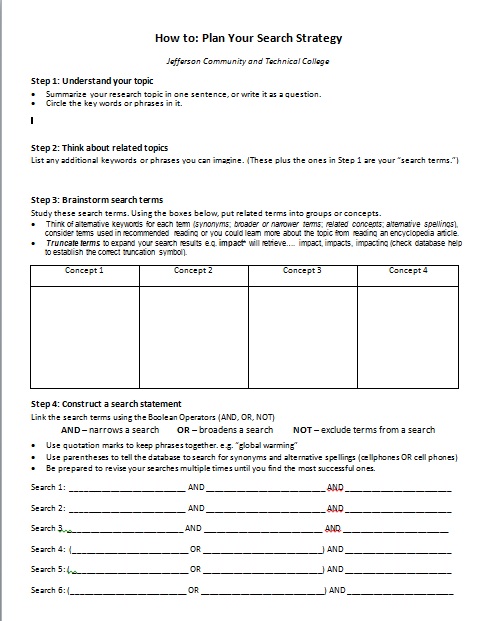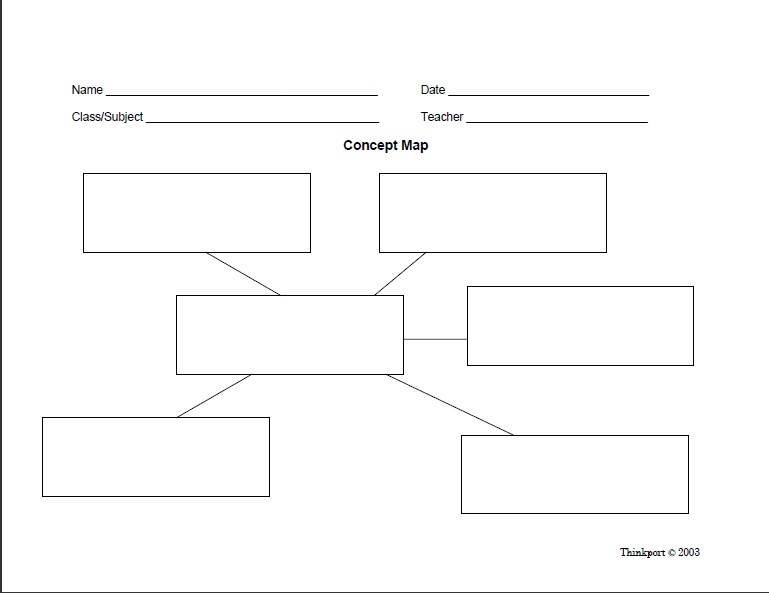
Monday - Thursday
10am - 4pm
Checked 2x Fridays
Tutoring - Writing, math and more
Learning Guides - Quick learning
Hours - Find out when we're open
Library Search - Find materials
Databases - Articles and more!
InterLibrary Loan - Request books
Books - Recommended books
eBooks - Thousands of free eBooks
Streaming Video - Learn by watching
Use the Library Search to find books, eBooks, articles, and more!
1. Choose a preliminary topic. Once you begin researching, you might change this slightly or completely throw it out.
2. Identify keywords and concepts, using online tools like those shown at right or using a dictionary or thesaurus.
3. Develop a search strategy using your keywords.
4. Use Boolean operators (and/or/not) to refine your searching.
5. Find useful terms in your search results and retry your searches.
Need help to develop a search strategy? Use our downloadable research plan worksheet.

Click on the link below to open the PDF file.
Your first step in any project will be to choose a topic.
But choosing a topic isn't as simple as saying "I want to write about diabetes." Searching for diabetes will return an overwhelming amount of information. So you'll need to narrow your topic and come up with the keywords you’ll need to search for books and articles on your topic…and this is before you even start researching and writing!
Here are some free online tools to help you through the process (Source: University of Mississippi Libraries)
VisuWords is an online graphical dictionary. Put in any word and watch it go!

bubbl.us provides you with a fun way to map and visualize your topic. You have to create an account (it’s easy) to save, print and export. Rather than generating terms for you, this tool allows you to plot out your own words and connect them. bubbl.us is also great for group projects because you can add collaborators.

Concept mapping is another tool that you can use. There are templates that you can print out from the internet, like these at Thinkport. Or you can create one on your own using a sheet of scrap paper.

When searching for information about your topic, whether in the library catalog or on Google, it's important to come up with an extensive list of search terms.
Souce: Technorati
Search terms are important concepts related to your topic. They also might be synonyms for words that mean the same thing. You need to look for different variations of words because not everyone will use the same terms to describe a topic. Think about the death penalty. If you only searched using that phrase, you would miss out on a lot of good information that refers to the same concept as capital punishment.
Let's say you are looking for information about why the 1990s are referred to as the Dawn of the Information Age, particularly in terms of how we began to use computers to communicate.
Step 1: Identify the main concepts in your search.
1990s Computers Communicate
Step 2: Take each one of those concepts and brainstorm related words that might be useful. You might have to consult other sources for help.
Where do you find keywords and synonyms?
For our research question, we might come up with the following words:
| 1990s | Computers | Communicate |
| Nineteen Nineties | personal computers |
communication |
| Nineties | PCs |
new media |
| '90s |
home computers |
24-hour news cycle
|
| 1990-1999 | Internet Internet access the net |
email |
| 1990's | World Wide Web web web browser |
cell phones |
| America Online (AOL) |
instant messaging |
Step 3: Now that have a list, combine these terms using Boolean Operators to create searches. The video below explains what the three main Boolean Operators are and how you use them. From Lexy Spry & Emily Wixson, Chemistry Library, University of Wisconsin-Madison.
Step 4: Try combinations of these words when you go to search for information in the library catalog, the library databases and Google. Searching is a trial-and-error process, so be prepared to try a lot of different searches before you learn which ones will produce the best results.
Need help to do this and want to try it on paper? See our Search Strategy Worksheet in the box at left.